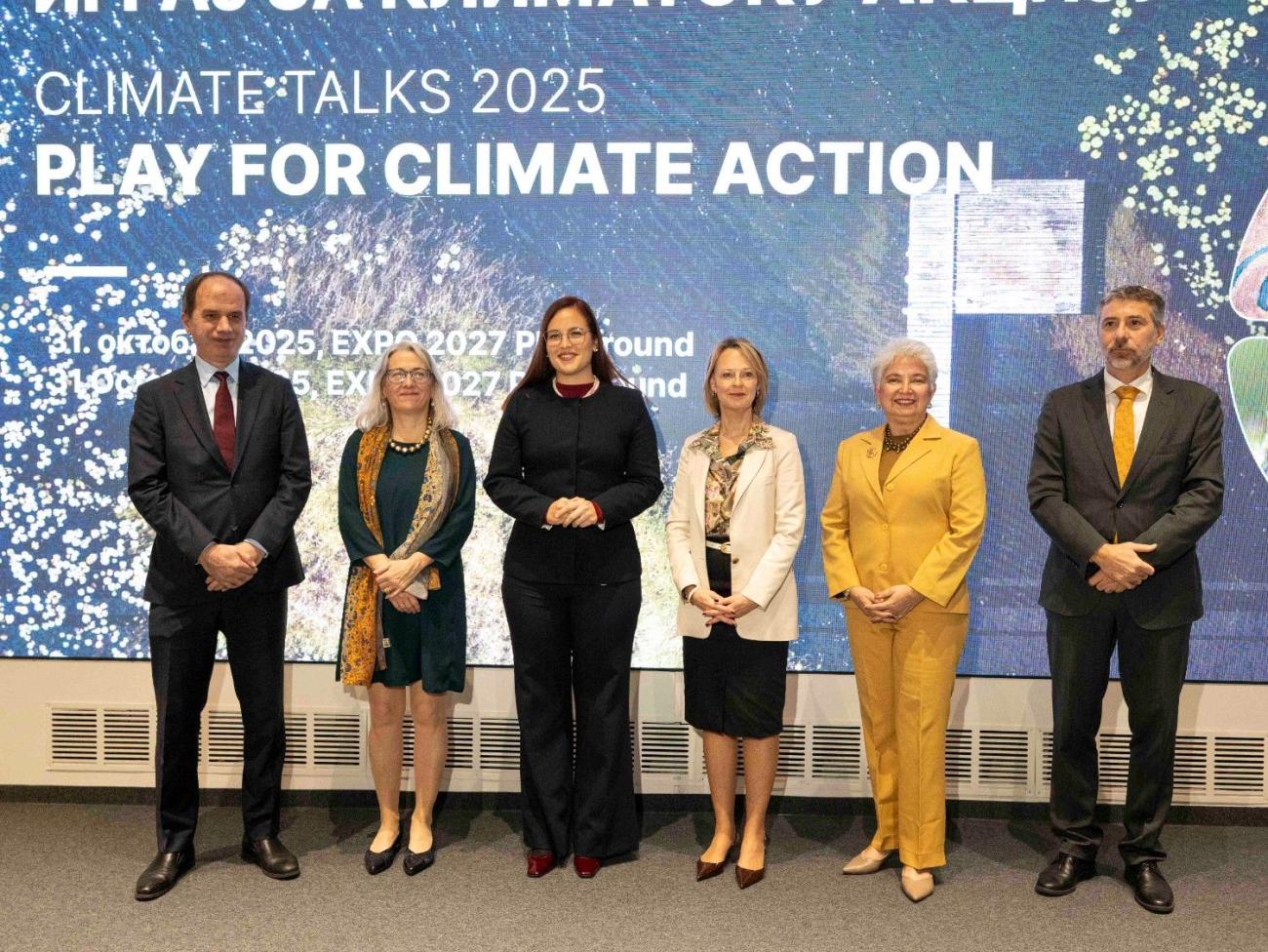Decarbonization and timely adaptation necessary for an effective response to climate change in Serbia

Climate Talks – Play for Climate Action held
Belgrade, October 31, 2025 - Representatives of national institutions and international organizations, as well as experts in fields related to climate change, discussed today at the "Climate Talks" Serbia's strategy for advancing decarbonization, as well as possible solutions for droughts that are increasingly affecting agriculture, energy and local communities.The event was traditionally organized by the Ministry of Environmental Protection in partnership with the United Nations Development Program and the United Nations team in Serbia.
Minister of Environmental Protection Sara Pavkov, opening the event, highlighted that since the previous meeting, the Ministry of Environmental Protection has taken significant steps to strengthen the framework for combating climate change, including the adoption of the Third Nationally Determined Contribution (NDC).
"This is our most ambitious goal so far, as the Republic of Serbia has committed to reducing greenhouse gas emissions by 40.1% compared to 1990 levels by 2035. This target is four times higher than the first NDC from 2015 and significantly exceeds the 2022 goal. It demonstrates Serbia's strong commitment to implementing the energy transition, strengthening resilience to climate risks, and accelerating the green transformation of society", said minister Pavkov, adding that several other important frameworks have been adopted, which are crucial for achieving the goals of the Green Agenda for the Western Balkans and fulfilling obligations under the UN Framework Convention on Climate Change and the Paris Agreement.
The acting UN Resident Coordinator and UNDP Serbia Resident Representative, Yakup Beris, reiterated the recent warning of the UN Secretary General Antonio Guterres that the increase in the average global temperature in the next few years will exceed the limit of 1.5°C, a red line agreed ten years ago by the Paris Agreement. Some climate impacts are now unavoidable, which is why adaptation is not optional, but essential.
“To support Serbia in responding to climate change, the United Nations and UNDP are assisting in improving the legislative framework, implementing innovative and practical solutions for the decarbonization of industry, and researching the potential use of geothermal energy and biogas. We are also working to improve climate risk assessment and to integrate sustainable strategies in sectors such as agriculture and energy”, Beris said.
Ambassador of the Federative Republic of Brazil to Serbia, H.E. Maria Clara de Abreu Rada, stressed that COP 30 will offer a critical moment to collectively address the gaps that threaten the credibility of our climate governance infrastructure.
„We must ensure that ambition is matched by implementation – and that developing countries receive the financial support, technology and capacity they need to act decisively. We need a clear, just, and orderly pathway beyond fossil fuels and towards sustainable energy sources“, said H.E de Abreu Rada an added that Brazil has recently invited the Government of Serbia to support its initiative which aims to quadruple the use of biofuels by 2035.
Head of Cooperation in the Delegation of European Union to Serbia, Mauro di Veroli, emphasized that we are at a crucial and complex moment for climate action.
“Ten years have passed since the Paris Agreement, marking a turning point in our collective journey towards joint stewardship of our planet and its resources. The pace of global climate action however remains far too slow, and ambitions must scale up significantly to address the challenges ahead of us. The European Union is committed to support Serbia in climate action, including through investments in crucial infrastructure, providing policy advice, building capacities and assisting Serbia in aligning with the EU climate acquis,” explained di Veroli.
Ambassador of Switzerland to Serbia H.E. Anne Lugon-Moulin pointed out that only by working together, we can turn climate goals into concrete action that benefits both people and the planet.
„Switzerland strongly supports Serbia’s efforts to accelerate decarbonization and advance the Green Agenda. Together with partners such as UNDP and international financial institutions, we are helping turn climate goals into tangible and measurable results on the ground. Our shared goal is clear: reducing emissions, building a more resilient economy, and improving the quality of life for all citizens”, said H.E. Lugon-Moulin.
Opening the panel dedicated to drought, the Ambassador of Sweden H.E. Charlotte Sammelin, said that response to that silent crisis must be rooted in resilience, restoration, and international cooperation.
“Drought is no longer a distant threat—it is a present and pressing reality. In Serbia, its impact spans over agriculture, energy, and ecosystems, exposing deep vulnerabilities. Sweden is proud to support Serbia’s efforts to build climate resilience, restore wetlands, and promote sustainable solutions that protect both people and nature,” added H.E. Ambassador Sammelin.
"Climate Talks: Play for Climate Action" was held on the eve of the 30th Conference of the Parties to the UN Framework Convention on Climate Change, which is taking place from 10 to 21 November in the Brazilian city of Belém.







